During our teen and college years in the early and late 1970s, one word that we used to define the friendship whenever we were seen talking to a boy or a girl was ‘platonic.’ In majority of the friendships between two opposite sexes this was true because whether a boy or a girl would not dare cross that line. And a few boys who did cross the line were affectionately called Casanovas but the girls derogatively referred to as nymphomaniacs.
However, the same sex relations were hardly discussed as it never came out in the open. But if a boy acted like a girl he was called a pansy and a girl who behaved like a boy a tomboy. Nobody ever commented on gay or lesbian relationships and if there were people with such inclinations it was all closeted that hardly came out in the open.
These were the thoughts that ran through my mind as I watched grippingly, “Ondu Preetiya Kathe,” a play about lesbian relationship at Kiru Rangamandira staged by Bangalore Theatre Collective and directed by Venkatesh Prasad, on July 29.
The play is based on well-known Marathi Playwright Vijay Tendulkar’s ‘Mitrachi Ghoshi.’ This was set in the pre-independence era, in a college campus in Poona (now Pune). The story begins when a conventional boy meets girl way, but as it unfolds, one is caught in various emotions depicted by the actors.
Director Venkatesh Prasad, who has also translated the play from English to Kannada, has adopted it to the contemporary times especially with the LGBT (Lesbian, Gay, Bisexual, Transgender) Community now coming out in the open. Section 377 of IPC dating back to 1871, was introduced during the British rule in India. It criminalised certain sexual activities including homosexual relations.
The play opens with Ajay (B.V. Shrunga), the central character, an engineering student, who narrates the story of his girlfriend Preethi Shenoy (Ujwala Rao, who is also the Assistant Director). He holds the stage for almost two hours with his fine acting depicting various emotions.
The action begins, the moment Preethi, who has also joined the engineering college in Mysuru, enters on a scooter and the fleeting moments that she provides moving in and out of stage. The shock that Ajay goes through when she holds his hand and then tells that she is different is something that all of us in spite of having so called liberated minds, finds it difficult to accept just as the narrator feels and emotes so beautifully.
Knowing that Preethi is different and realising that he can have only a platonic relation with her, Ajay fiercely tries to protect her from everyone as he knows that such an ‘ab’normal behaviour will never be accepted in the college or in the society.
However, Preethi being free spirited and fiercely independent, finds a girl Lahiri (Vyjayanthi Adiga) in the college who responds to her feelings when they come together to perform during a college fest and thus begins her fall to the depths.
Meanwhile, Ajay’s roommate Patil (Sunil Kumar), who with his antics gives a comic relief to the play, falls in love with Preethi. But Ajay tries to deftly avoid any meetings as he knows Preethi’s inclinations. Another villainous character Vishal Patil (Vikram), a playboy and boyfriend of Lahari makes all effort to draw her away from Preethi. The more he tries, the more Preethi’s desperation for Lahari grows.
Here, another dimension of the human relation is subtly introduced almost showing that Lahari swings both ways even as she continues her relationship with Preethi, who with her wild mood swings continues to confront Ajay with her demands and Lahiri with her love.
The play ends rather dramatically just as it had begun with suicide attempt by Preethi. Did Preethi with her identity crises and her questioning mores of the society do the right thing? Did her attitude lead her to self-destruction? Is the society at least now ready to accept that any kind of sexual relations confined to the four walls is a matter of personal choice?
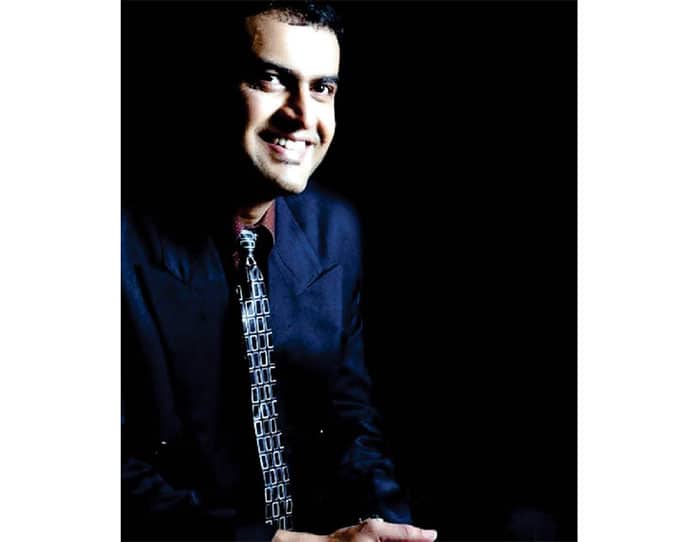
Venkatesh Prasad, Director
These are the questions that Ondu Preetiya Kathe raises.
The mature house-full audience in Kiru Rangamandira were glued to their seats as they laughed, cried, wondered, gasped, through the 110 minutes of the play without a break, as each actor played his, her role to perfection. Director Venkatesh Prasad treats even the most sensual and sensitive moments in the play with dignity and grace which is what stage performance and craft is all about.
“We were really wondering how the audience would react. Hence, when we decided to do the play, we did a lot of research and first talked to the people in the LGBT community seeking their reaction. Only when they gave their approval did we go ahead. In fact more than the rehearsals it was days and hours of discussion that we did to see that the sensibilities of people are not hurt,” said Venkatesh Prasad speaking to Star of Mysore.
Kiru Rangamandira is a new theatre that has come up in Kalamandira premises. “We had to face a lot of problems, (unlike in Bhoomigeeta where we had performed earlier and both sound and light is very good) as the sound and light facility is very poor. We were forced to switch off the fans as the sound when we were rehearsing was not clearly audible,” he said.
Vijay Tendulkar chose not to represent homosexuality through men as it is more common but through women and extended it beyond and spoke about liberation of women in that era. Thus showing that such thoughts and feelings are as relevant today as they were in the past, he said.
Since the Supreme Court itself has asked the society to accept all gay relationships and clearly said that all suppressions is wrong, Venkatesh Prasad and his team, the Bangalore Theatre Collective, want to take this play to all colleges to create awareness among the student community that people’s leanings is their personal choice and should be treated with concern and care.
An interview with the Director
In a telephonic interview with Vighnesh Hampapura for Star of Mysore (SOM), Director Venkatesh Prasad opens up about the play, its production, and his theatre sensibilities. Excerpts:
SOM: ‘Mitrachi Goshta’ is set in the pre-independent era. Why change the setting of the play to the present day? How did this develop?
Venkatesh Prasad: We never had an idea about performing this play. I was reading a lot to pick an interesting one. I read this, and I wanted to stage it. There are too few plays about homosexuality in Kannada — there’s one about male homosexuality, based on Vasudhendra’s Mohanaswamy — but none on female homosexuality. This was surprising but also sad. As a theatre practitioner, I felt it was important to do this. Vijay Tendulkar wrote Mitrachi Goshta is 1982, and set it even before. The question was whether this was relevant today and our friends in the LGBT community said the situation isn’t vastly different. Except in the metro cities, the taboo — as depicted in a three decade old play — is still there, the resistance, the prejudice, all that. So, we set it today.
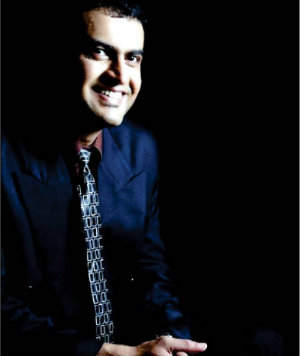
Venkatesh Prasad
There’s a love triangle in the original. In this play, either because of Ajay’s characterisation or Shringa’s touching performance, we felt he rather remained a good friend. Was this a deliberate change you made while you were scripting?
Initially, he does have feelings. Once she tells him about her sexuality, though, he backs off, and stands by her all through her journey in spite of being unaware about homosexuality. He doesn’t know, but as a good human being, he does try. That’s the essence, for me: You may not understand what homosexuality is or feels like, but you can still be a human being and look at them as fellow human beings.
That came out really well. He doesn’t understand, but he’s caring and considerate. And we don’t need to understand everything to support them. The message really is that homosexuality is as normal as heterosexuality, and in a relationship, there are the same feelings, same problems. Just consider it as any other relationship, don’t break your head.
SOM: Interestingly, you’ve set the play in an engineering college in Mysuru. That is daring but also important…
Prasad: It’s essential to know that homosexual beings are everywhere — in your city, in your university, in your family… There’s a dialogue in the play: “A boy and a girl cannot dance together on stage because it’s not our culture.” But when the two girls who did dance on stage get together, society scrutinises too. What do you think about this, about love and sexuality — what is our culture? And should the question of culture even arise when we’re speaking of love?
SOM: The question is there because the answers are there. Wrong answers, but they’re there…
Prasad: Yes. It’s bizarre to say only a boy-boy and a girl-girl can dance together. To my shock, there’s this rule is in many colleges today too! We’re putting so many wrong ideas into children’s minds with the label of culture. Hate, jealousy, violence has less policing than love has — it’s crazy!
SOM: You say this isn’t a glorification of a problem, but a warm love story. Indeed. Although, the problems the society has placed on homosexuality did flow into the play, rightly. My question is — this is about theatre in general, and this play in particular — is it also the play’s responsibility — because it deals with the subject — to educate and tackle the misinformation?
Prasad: That’s a big one. Is it the responsibility of theatre? Okay, not only of theatre; but also of theatre?
I hail from the Samudaya. You must know about it — established with the idea that art isn’t for art’s sake, but for human beings. I don’t believe that art and culture can live alienated from the society or the politics that surround it. Any citizen has the responsibility to engage with the conundrums surrounding them with their work.
That’s a perspective shared by many. It’s a good entry point to think about what we do with our art, with our theatre. I believe in the philosophy of Samudaya: Art for human beings. If your apolitical work doesn’t engage with the society, what is your quest? What is your understanding? What is your society, and how do you deal with it? Those questions!
The moment we say ‘homosexuality,’ we turn to Western theories, because we don’t have literature! Mohanaswamy is one, your play is another — don’t you think more literature is necessary?
Of course! We’re not proud that our play is the first. I say it with regret that there’s not a single play even for reference. In India, we have a lot of discourse about so many issues: The Dalit movement, even feminism, poverty, capitalism. Political parties have used it to their advantage. But about the discrimination faced by the LGBT community: None.
They themselves have a forum and protest — but nothing from the society they live in. You don’t see the mention of gay rights in any political manifesto. We live as if they don’t exist. We need more literature and theatre about this so that we reach more people, so that people understand that homosexuality is a thing, and it’s as normal as anything else.
SOM: The original Marathi with Rohini Hattangadi was “hated by women and sneered at by men”, as Tendulkar put it. Only three rows of audience. I hope that didn’t happen to ‘Ondu Preetiya Kathe.’ Were there any other challenges? How did the LGBTQ community receive the play?
Prasad: Yes, there were some artistic hassles. First, we must craft it well. Then, we’re dealing with a subject we are not really aware of. We’re heterosexuals — outsiders. We took help from our friends from the LGBT community: Reading sessions and opinions. But I’ll tell you something sad: Our position is not so different from Mitrachi Goshta. In Mysuru, both times, it was a nearly full show. In Bengaluru, we had scanty response. Sadly, many of them tell me that they can’t make it because of the subject. They’re theatre people, educated folk. Is it difficult to even watch a play about homosexuality? That’s a picture of where we are.
SOM: It’s a sorry state of affairs indeed. Thank you for this interview and importantly for the play. Debates about Section 377 are on right now, and it’s fulfilling to see support through theatre. I hope you take it to many more places, and it touches many more hearts. Prasad: I hope for the same. Thank you.
By N. Niranjan Nikam



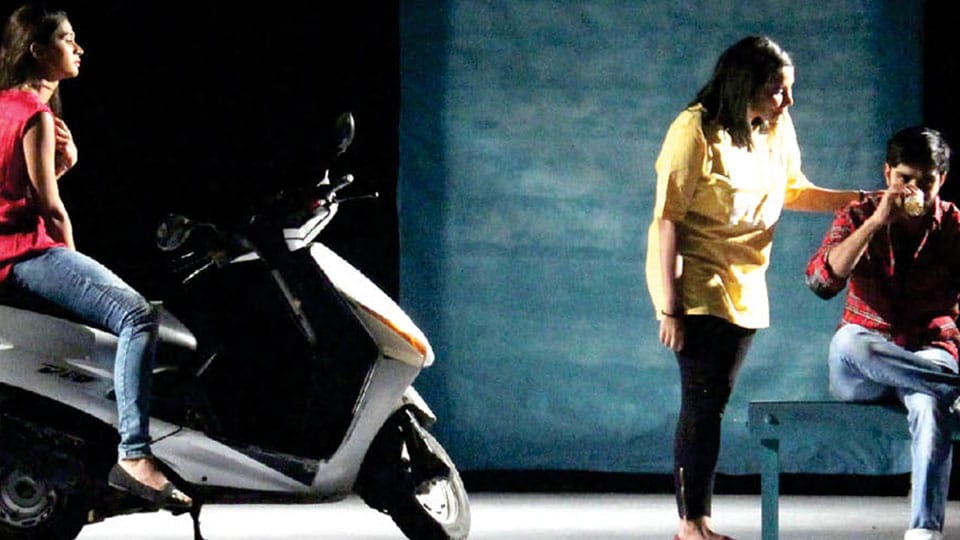
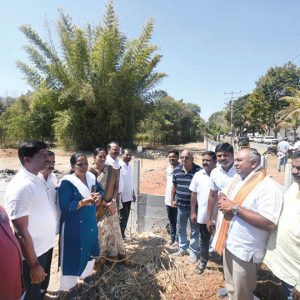
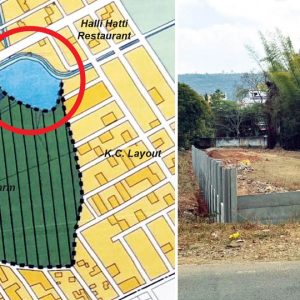
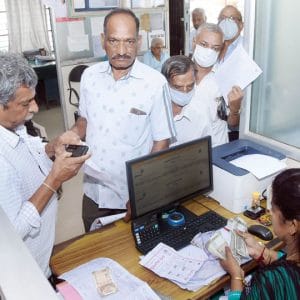
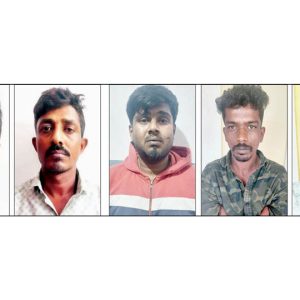
We all have different love.